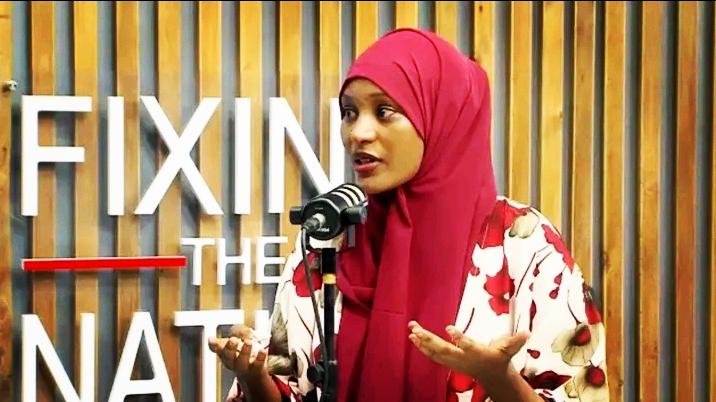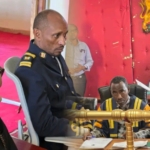In a heartbreaking incident that has sent shockwaves through Nairobi’s Somali community and beyond, the mysterious death of 35-year-old Farhia Ahmed has ignited a fierce debate on justice, victim-blaming, and femicide in Kenya.
Prominent activist and journalist Hanifa Adan, known for her tireless advocacy against gender-based violence and social injustices, has publicly condemned the community’s response, accusing many of prioritizing judgment over demands for accountability.
As police launch a manhunt for the prime suspect, Chelsea Mwangi alias “Mcheche,” the case underscores deeper issues of violence against women in urban Kenya, where femicide rates continue to alarm human rights groups.
The Tragic Discovery: What Happened to Farhia Ahmed?
Farhia Ahmed, a Somali woman residing in Nairobi, was found lifeless in a room at the Fuata Nyayo Guest House in South B on the morning of September 2, 2025.
According to police reports filed at Mariguini Police Post under OB 11/01/09/2025, she had checked into the Kangema Guest House section of the facility the previous night, Sunday, September 1, around 11 p.m., accompanied by Mwangi.
The pair appeared to be in good spirits upon arrival, but the night took a deadly turn. The following morning, a cleaner at the guest house made the gruesome discovery.
Ahmed’s body was sprawled on the bed, with severe head injuries and blood oozing from her nose and mouth, indicating a violent assault.
Mwangi, who had booked the room, was nowhere to be found, having allegedly fled the scene before dawn. Police confirmed visible signs of trauma, including injuries to the back of her head, pointing to foul play.
Her body was swiftly transported to a nearby mortuary for a post-mortem examination, as investigators work to piece together the events leading to her death.
This incident is not isolated. Nairobi’s South B area, a bustling suburb with a significant Somali population, has seen a rise in violent crimes, including assaults in lodging facilities.
Authorities have urged anyone with information on Mwangi’s whereabouts to come forward, describing him as a key person of interest in what is being treated as a murder investigation.
As of September 4, 2025, the suspect remains at large, heightening fears among residents about safety in affordable guest houses often used by transients and couples.
Hanifa Adan’s Scathing Critique: From Judgment to Justice
Hanifa Adan, a 28-year-old Kenyan activist of Somali descent, rose to prominence through her grassroots work in Nairobi’s Korogocho slums, where she was born and raised.
With a background in journalism and mass communication, Adan has become a vocal force in digital campaigning, fundraising for victims of violence, and advocating against female genital mutilation (FGM) and other gender injustices.
She is the founder of initiatives like the Mazingira Movement and has been recognized for bridging community needs with broader policy advocacy.
In a poignant post on X (formerly Twitter) on September 4, 2025, Adan expressed her dismay at the Somali community’s reaction to Ahmed’s death.
“That young Somali girl was murdered in the most brutal way, yet instead of demanding justice for her, the community has turned to judgment and self-righteousness.
It’s utterly heartbreaking. May Allah forgive her shortcomings, grant her Jannah, and ensure her killer is held accountable,” she wrote.
Her statement quickly gained traction, highlighting a troubling pattern where victims of violence, particularly women, face posthumous scrutiny based on their personal lives rather than unified calls for justice.
Adan’s criticism stems from whispers within the community suggesting Ahmed’s death was somehow linked to her choices, such as checking into a guest house with a man outside of marriage—a narrative that shifts blame from the perpetrator to the victim.
This victim-blaming, Adan argues, perpetuates a cycle of silence and impunity in cases of gender-based violence.
Her words echo her broader activism: In interviews, she has shared how discovering the power of online fundraising during the COVID-19 pandemic transformed her approach to community support, raising millions for medical bills and social causes.
Yet, she has faced backlash for her outspokenness, including debates over her role in victims’ compensation panels amid human rights concerns.
Broader Context: Femicide and Community Dynamics in Kenya
Ahmed’s death adds to a grim statistic: Kenya has witnessed a surge in femicide cases, with over 500 women killed in gender-related violence between 2016 and 2023, according to human rights reports.
In Nairobi alone, incidents involving intimate partners or acquaintances in lodgings are alarmingly common, often exacerbated by economic vulnerabilities and cultural stigmas.
The Somali diaspora in Kenya, concentrated in areas like Eastleigh and South B, faces unique challenges, including discrimination, economic marginalization, and internal pressures to conform to conservative norms.
Activists like Adan point out that such tragedies expose rifts within communities. While some online voices have echoed her call for accountability—praying for Ahmed’s soul and demanding Mwangi’s arrest—others reflect the judgment she decries.
For instance, discussions on social media have speculated on Ahmed’s background, diverting attention from the crime itself. This mirrors global patterns where marginalized communities internalize societal biases, hindering collective action against violence.
Human rights organizations, including Amnesty International Kenya, have called for swift investigations and protections for women in vulnerable situations. “Cases like this demand not just police action but community introspection,” noted a spokesperson in a recent statement on similar incidents.
The Road Ahead: Calls for Accountability and Change
As the investigation unfolds, Ahmed’s family and supporters await justice. Police have appealed for tips, with Mwangi’s alias “Mcheche” potentially aiding in his identification through social networks.
Adan’s plea resonates as a rallying cry: Shift from self-righteousness to solidarity. Her activism, from anti-FGM campaigns to youth empowerment in social movements, positions her as a beacon for change in Kenya’s evolving landscape of gender equality.
In remembering Farhia Ahmed, the focus must remain on her life cut short and the urgent need to combat femicide. As Adan aptly puts it, true justice begins with empathy, not judgment.
For updates on this case, follow ongoing reports from Nairobi authorities and community advocates. If you have information, contact Mariguini Police Post immediately.
Share This Post





